
Пособие Борисова (англ для инженеров базовый)
.pdf
29
3. Grammar
3.1Which words are missing in these sentences? Use 2.1 and 2.2 for help.
a.If you are good at sports, you …… apply for a grant.
b.Most students …… take a student loan from the bank.
c.If you live away from home, you …… pay for your accommodation.
d.If you do post-graduate study, you …… get an MA or an MSc.
3.2Read the sentences. What is the meaning of CAN in them? Sometimes both are possible.
1.I can do it. = I know to do it. 2. I can do it. = It’s possible for me to do it.
a.I can speak two languages.
b.I can do an MSc after I get my Bachelor’s degree.
c.We can’t play loud music in the hall.
d.Can I apply for this grant?
e.I can pay for my accommodation myself.
f.You can’t swim, can you?
3.3Listen to the sentences. Are the positive or negative? Listen again and repeat.
3.4Make sentences about yourself. Use CAN or CAN’T.
e.g. speak Chinese – I can’t speak Chinese.
a.speak German
b.run 20 kilometers
c.sing very well
d.play a musical instrument
e.swim
f.play football
g.ride a bicycle
h.understand my teacher of English
3.5Listen and complete the conversation.
-Canyousing?
-………
-Canyouplay a musical instrument?
-………
-What canyou play?
-………
-Canyoudance?
-………
Listen again and repeat. Copy the rhythm.
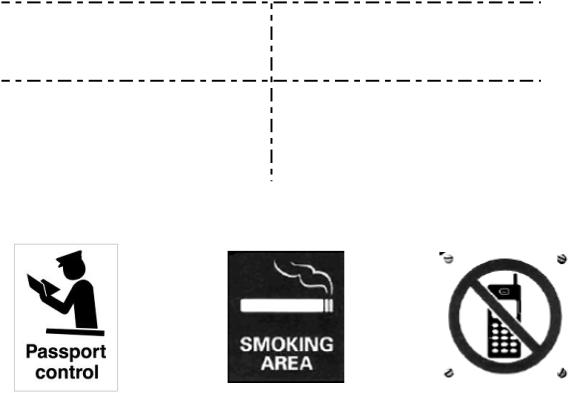
30
3.6Listen and answer the questions for yourself. Give true answers. e.g. – Can you speak English? – Yes, I can, but not very well.
3.7Read the adverts from a newspaper and act out job interviews.
Classifieds
Musician wanted. A newly |
Secretary wanted. German, good |
formed band needs a front |
English, computer skills, office |
man/guitarist/composer. |
machines. |
Health Club looking for sports |
Family with two small kids |
instructor. Winter sports. |
looking for a baby sitter. |
|
Weekends, evenings, cooking, |
|
driving kids fromschool. |
3.8 Look at the pictures and match them with the correct sentences.
1. You have to show your |
1. You have |
to smoke 1. You have to switch off |
passport. |
here. |
your mobile. |
2. You can show your 2. Youcan’t smoke here. passport.
2. You don’t have to switchoff your mobile.
3.9Make sentences about your studies. Use HAVE TO or DON’T HAVE TO.
a.Students ____ wear a uniform.
b.Students ____ take exams.
c.They ____ to pay for their accommodation.
d.All students ____ pay tuition fees.
e.You ____ get up early every day.
f.You ____ speak English at your English lessons.
g.You ____ do reading for seminars.
h.You ____ pay off a student loan.
3.10Listen and agree/disagree with the sentences.
e.g. – You have to wear a uniform. – No, I don’t have to wear it.
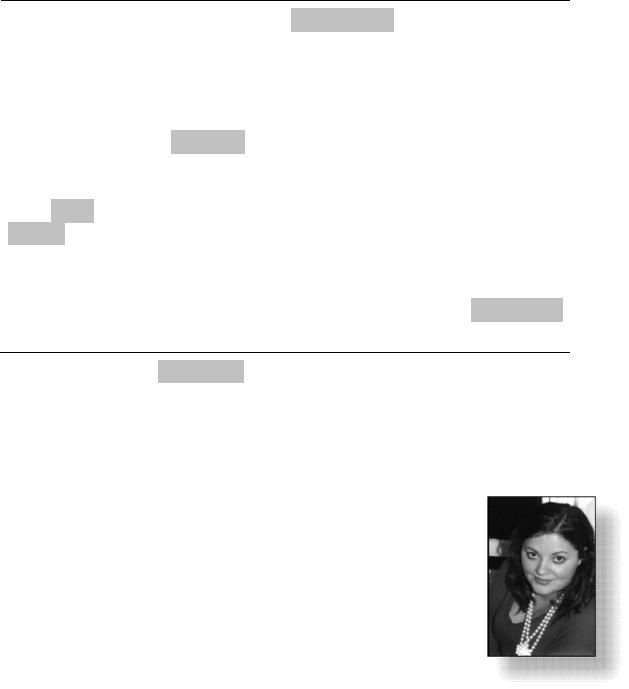
31
4. Reading and speaking
4.1 Read about the Open University in the UK. How is it different from other universities?
The Open University (OU) is a British long-distance learning institution. It allows all kinds of people to study for a degree. Housewives, grandfathers, busy workers, and people with health disabilities (ограниченные физические возможности) can do a bachelor degree course.
You can have almost unlimited time to complete a degree. The students choose how many modules to do each year, until there are enough (достаточно) for a degree. So they can continue to work and study in their spare time. The time of exams and assignments, however, is not flexible, so self-discipline is very important.
The OU uses various methods for distance learning, for example, written and audio materials, the Internet, television programmes and materials on DVD. For most courses, students contact with tutors at face-to-face tutorials, by telephone, and/or onthe Internet.
Guess the meaning of the highlighted words. Check it with a dictionary.
Make 5-6 sentences about OU students and what they have to/don’t have to do to complete a degree.
e.g. OU students have to take exams. or OU students don’t have to live in university accommodation.
4.2 Roxy Freeman is a web journalist, a loving mother of two children and an Open University student. In her blog she often writes about her studies there. Interview Roxy about her life, and act out the conversation.
e.g. – Do you have to work? or How often do you have to contact your tutor?
5. Reading and listening
5.1Read the text and answer the questions.
a.Who has to study longer, a technologist or an engineer?
b.Which is higher in educational context, a diploma or a degree?
c.Can you get BEng at college in the UK?
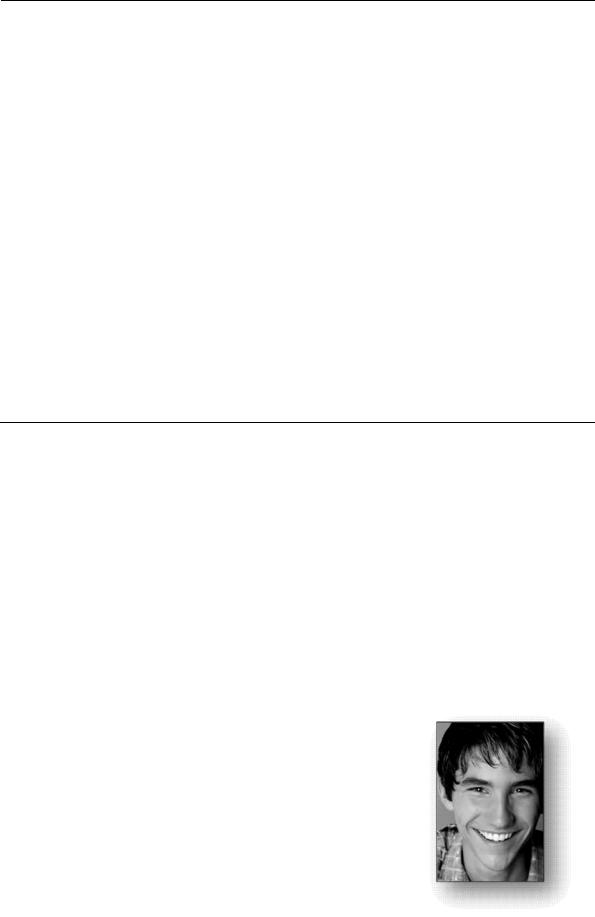
32
Can ‘sandwich’ course students work and study at the same time? What is the difference between a technologist and an engineer? The main difference is in level of education and training. Engineers have advanced training and normally hold university degrees.
In training contexts, a technologist is normally someone usually trained for 2-3 years. You can progress from technologist to engineer by following courses at colleges and universities. Colleges offer certificates and diplomas (a diploma is a higher level qualification than a certificate). Universities offer degrees.
As an example, in the UK system, most young people who want a career in technology start by studying at a college of further education or university. They would normally follow the scheme: HNC (Higher National Certificate), HND (Higher National Diploma), BEng (Bachelor of Engineering degree). Some universities allow students to transfer to a degree course early, after completing only one year of a diploma course.
It is also possible for students to leave school at sixteen and work as an apprentice with a company. The company can then release them from work for some time every week to study at a college. This is called a part-time, or ‘sandwich’ course.
5.2In the text find the words which mean the following.
a.a person who learns through work
b.to develop in a positive way
c.more complex, high level
d.profession, life occupation
e.to move from one course to another
f.to let someone go
g.post-school education, but not at university
5.3Alex is a college student from Scotland. He takes an HND course in Civil Engineering. Civil engineers work in the planning and construction of buildings, airports, bridges, highways etc. Listen to him and mark the sentences True or False.
Listen again and check your answers.
a.The course takes two years.
b.Alex is in the second year.
c.There are no girls in his group.
d.Alex wants to do a degree at university.
e.He wants to take Structural Engineering.
f.A BEng takes three years.
g.Alex is interested in building roads.
h.He wants to travel in his job.

33
6. Conversation patterns
6.1 Which reply is the best in these situations? Listen to the conversations and check.
a. Student:Can yousay that again, |
b. Student:Can you write it onthe board, |
please? |
please? |
Teacher:1)No, thanks. |
Teacher:1)Yes, sure. |
2) Yes, it’s ‘uncle’. |
2) I don’t understand. |
|
|
c. Student:Can youplay the recording |
d. Friend:CanI use your phone? |
again? |
You:1)Go ahead. |
|
|
Teacher:1)Yes, please. |
2)Yes, please. |
|
2)Yes, of course.
6.2Listen and copy the rhythm.
a.Can you say that again, please?
b.Can you write it on the board, please?
c.Can you play the recording again?
d.Can I use your phone?
e.Can I have a pen?
f.And can I send a fax, please?
6.3Practise asking politely for more things. Work in pairs. Let your partner reply.
a.You want the bill in a café.
b.You want to use a computer.
c.You want to send an email.
d.You want to have a glass of water.
e.You need some paper.
f.You ask to open the door for you.
g.You want to know the time.
h.You want to use the toilet.
i.You want someone to take your photo.
7. Writing
International undergraduate students have to complete a special application for admission form.
1.Read the sample form of Leeds Metropolitan University, UK. Complete the form carefully with your personal details.
2.Write a short personal statement to explain which course you want to take and why. Choose a course from the list.
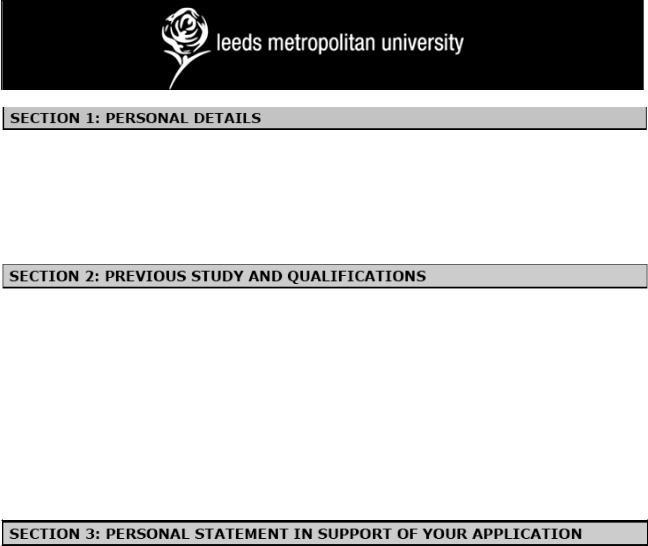
34
Course title ……………………………………………………………………………
Name …………………………… Nationality ………………………………………
Male/female………………………... Date of birth …………………………..………
Tel. ………………………………… Email …………………………………………
Please list in chronological order all the academic studies completed and current. You must include certified copies of your certificates and exam results. English languages qualifications can be listed here.
…………………………………………………………………………………...........
…………………………………………………………………………………………
…………………………………………………………………………………………
…………………………………………………………………………………………
Include reasons why you want to study at Leeds Met, the reason for your choice of course and any future career plans.
………………………………………………………………………………………….
…………………………………………………………………………………………
…………………………………………………………………………………………
…………………………………………………………………………………………
…………………………………………………………………………………………
Date …………………………….. Signature …………………………………………
__________________________________________________________________
35
List of courses for international undergraduate students:
Electrical Engineering; Health and Safety; International Management; Public Relations; Information Technologies; Sport Management; Petroleum Engineering; Construction Design; Architecture; Geology; Forest Management etc.
OVER TO YOU:
1.Can you describe a university course?
2.Can you say what students have to do to complete a degree at your university?
3.Can you say what you have to do to become a specialist in your field of studies?
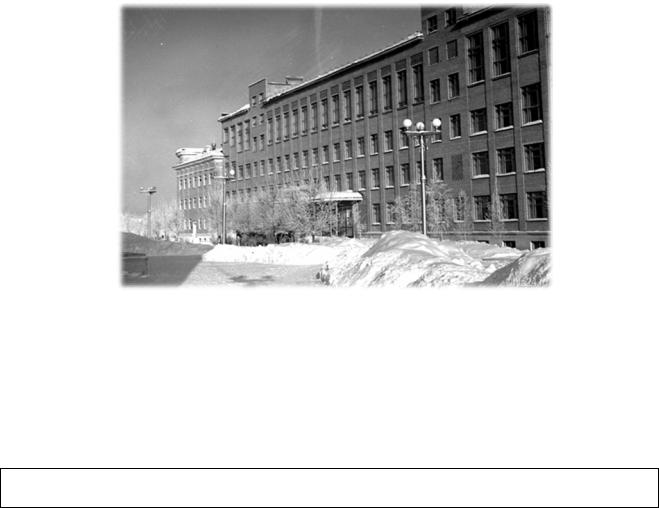
36
Module 5
ALMA MATER
Look at the photo. What is this place? When was the photo taken? (1948/1968/2008)
1. Pronunciation and grammar
1.1 Listen and choose the year you hear. Practise pronouncing the years.
a. |
2016/2006 |
d. |
1889/1989 |
g. |
1804/1824 |
b. |
1985/1984 |
e. |
1878/1978 |
h. |
1970/1917 |
c. |
1919/1990 |
f. |
1913/1914 |
i. |
2030/2013 |
1.2 Listen and read the dates from the box.
2000 |
the 1960s |
1917 |
1939 |
the 1990s |
1945 |
1961 |
2010 |
1.3Make true sentences. Use the dates from 1.2.
a.The Russian Revolution was in _____.
b.The Beatles were popular in _____.
c.The Second World War was from _____ to _____.
d.The first man was in space in _____.
e.In ____ the President of Russia was Vladimir Putin.
f.Friends was one of the most popular TV shows in ____.
g.The XXI Olympic Games were in Vancouver in ____.
1.4Complete the questions with WAS/WERE. Work in pairs, ask and answer the questions.
a.When ____ you born?
b.Where ____ your mother born?
c.What ____ the name of your first teacher at school?
d.Who ____ the first President of the USA?
e.____ the Beatles from the USA?
f.____ Moscow the capital of Russia in 1917?
g.What day of the week ____ yesterday?

37
1.5 Listen to the past forms of the regular verbs. Do they end with [t], [d], or [ d]?
worked studied arrived loved needed waited believed lived wanted liked decided invented travelled walked started died
2. Grammar
2.1 Angie is a student at Glasgow University. It was her day-off from classes yesterday. Listen and tick the things she did yesterday. Which verbs are irregular?
□got up late
□had a big breakfast
□drank tea for breakfast
□studied French
□went shopping
□bought newspapers
□went to work
□stayed at home
□listened to music
□cleaned her flat in the evening
□worked at a computer
□watched sports on TV
□cooked a meal
□had a party
□went to bed late
Which of these things did you do yesterday? e.g. I went shopping.
2.2 Listen to three questions. Which word do they start with? Use this word to answer the questions about yourself.
-____ you study English yesterday?
-____ you watch TV last night?
-____ you cook dinner yesterday?
-Yes, I ___.
-No, I ___n’t.
Find out how many people in your class did these things yesterday. Use the phrases from 2.1.
2.3 Angie and her friend Rick meet on Monday. Listen to them and answer the questions.
a.What did Rick do on Sunday morning?
b.What did Angie do on Saturday evening?

38
Listen again and complete Angie’s and Rick’s questions.
Angie:
a.Did you have …….?
b.What did you ……?
c.Where ……?
d.Did ……?
e.What……?
Rick:
f.What ……?
g.Who……?
h.Did …….?
i.Did …….?
Work in pairs. Act out the conversation between Angie and Rick.
2.4 What three things Angie didn’t do yesterday? Listen and check. Say what you didn’t do last weekend. Use the phrases from 2.1.
3. Conversation patterns
3.1Listen to five short dialogues. How do people show their interest?
1- I went shopping yesterday.
-Really? What ………?
2- We went to that new Italian restaurant last night.
-Mmm! ………
3- We saw a lot of our friends in the coffee bar.
-……….
4- I played tennis at the weekend.
-………
5- The party on Saturday was great!
-………
3.2Work in pairs. Ask and answer questions about your last weekend / your last night out. Show interest in your partner’s answers. Use the ideas for the questions from the box.
Who/go with? What/wear? Where/go? What/do? What/have to eat and drink?
-/meet anyone? How/go home? What time/get home? -/have a goodtime?
